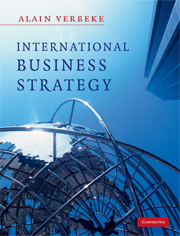Book contents
- Frontmatter
- Contents
- List of figures
- List of case studies
- About the author
- Foreword
- Acknowledgements
- List of abbreviations
- Walkthrough
- Introduction and overview of the book's framework
- Part I Core concepts
- Part II Functional issues
- Part III Dynamics of global strategy
- 11 Entry mode dynamics 1: foreign distributors
- 12 Entry mode dynamics 2: strategic alliance partners
- 13 Entry mode dynamics 3: mergers and acquisitions
- 14 The role of emerging economies
- 15A International strategies of corporate social responsibility
- 15B International strategies of corporate environmental sustainability
- Conclusion. The true foundations of global corporate success
- Appendix: Suggested additional readings
- Index
15A - International strategies of corporate social responsibility
from Part III - Dynamics of global strategy
- Frontmatter
- Contents
- List of figures
- List of case studies
- About the author
- Foreword
- Acknowledgements
- List of abbreviations
- Walkthrough
- Introduction and overview of the book's framework
- Part I Core concepts
- Part II Functional issues
- Part III Dynamics of global strategy
- 11 Entry mode dynamics 1: foreign distributors
- 12 Entry mode dynamics 2: strategic alliance partners
- 13 Entry mode dynamics 3: mergers and acquisitions
- 14 The role of emerging economies
- 15A International strategies of corporate social responsibility
- 15B International strategies of corporate environmental sustainability
- Conclusion. The true foundations of global corporate success
- Appendix: Suggested additional readings
- Index
Summary
This chapter examines Dunn and Yamashita's idea that MNEs truly can ‘do well’ and ‘do good’ at the same time. In other words, MNEs can engage in initiatives that not only benefit their stakeholders but also fulfil the firms' ‘corporate citizenship’ obligations to society. Dunn and Yamashita detail the benefits that can accrue to the MNE from ‘corporate citizenship’ initiatives, including market growth, knowledge, contacts and the development of international leaders. These ideas will be examined and then criticized using the framework presented in Chapter 1.
Significance
Corporate social responsibility (CSR) refers to good citizenship by the firm – i.e., its obligations to society, particularly when society is affected by the firm's strategies and practices. When expanding abroad, MNEs are expected to act as good local citizens in all the locations where they are active. Once considered merely a philanthropic option, good corporate citizenship is now increasingly imposed by the new economic reality of powerful NGOs, grassroots consumer networks and rapid international information dissemination. While good citizenship can be viewed as the equivalent of a cost increase, it can also be an opportunity to develop FSAs and to improve performance.
In a 2003 HBR article, Debra Dunn and Keith Yamashita suggest that it is often possible for firms to do well and to do good simultaneously. That is, profitable business models can go hand-in-hand with good citizenship and produce positive CSR outcomes.
- Type
- Chapter
- Information
- International Business StrategyRethinking the Foundations of Global Corporate Success, pp. 383 - 418Publisher: Cambridge University PressPrint publication year: 2009



